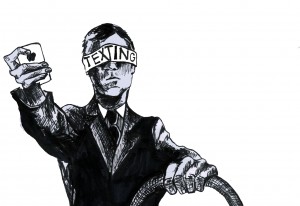
Texting and driving has managed to surpass drinking and driving as the No. 1 cause of accidents among college students. So why do we keep doing it?
Every so often, a national problem becomes so frequent that public service announcements are released to warn the public against such dangers. About 30 years ago, public service announcements targeted the dangers of drinking while driving. Now, a new breed of announcements illustrating the dangers of texting while driving has become more prevalent.
The campaign to prevent people from texting and driving has become huge. AT&T unveiled the “It Can Wait” campaign in 2010, making an increased effort to educate customers on the issue. The company also partnered with acclaimed filmmaker Werner Herzog on “From One Second to the Next,” a documentary detailing real-life stories of people involved in texting and driving accidents. The practice is even considered illegal in all states except Arizona and Montana, according to Business Insider.
Yet, even with such a big push to prevent it, texting and driving is still a major problem. A recent study from King’s College in Pennsylvania says that 80 percent of college students have admitted to texting while driving despite being aware of the risks. 
That last part is what shocks me. They know the risks, but they do it anyway. I could understand if the technology was still new and the number of fatalities wasn’t so high, but texting has been popular for close to a decade. Texting while driving has even managed to surpass drunken driving as the leading cause of death among teens, according to a study by Cohen Children’s Medical Center in New Hyde Park, N.Y.
It’s time people stop texting behind the wheel.
Unfortunately, I think this is easier said than done. While I believe keeping both hands on the wheel and focusing solely on the road should be common practice, we are living in a cellphone-based society and texting is one of the primary ways today’s generation communicates. One of the reasons students continue to text and drive is so they can remain connected, according to the King’s College study.
Yes, it’s a pain when somebody calls about an emergency and the other person can’t answer the phone because they’re driving. However, there are ways to circumvent that. If you have a passenger in the car, you can have them read the text for you. You can also tell people ahead of time you’ll be on the road, and remind them to call if they need you.
Either way, it’s important to get out of the habit of texting while driving. It’s not worth risking anyone’s life to type, send or read a message.
Nick Sestanovich can be reached at [email protected] or @Nsestanovich on Twitter.
Illustration by Liz Coffee.








